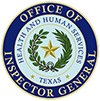Working together to prevent fraud, waste and abuse
Recognizing that prevention is a key part of its mission, the OIG initiated a formal process to enhance the OIG Prevention Strategy. This process facilitates increased coordination in identifying potential issues and executing prevention activities across health and human services. The OIG regularly participates in targeted prevention activities; some of the highlights from fiscal year 2021 are described below.
Stakeholder engagement
The OIG routinely engages with stakeholders and program integrity partners, including contractors, providers and staff from across health and human service agencies. During the second and third quarters of the fiscal year, the OIG met with stakeholders for information sharing sessions as part of the agency’s COVID-19 Fraud, Waste and Abuse Initiative. Over the coming months, the OIG will continue to focus on this prevention effort through:
- Additional stakeholder discussions.
- Continued research through data analytics and policy analysis.
- Ongoing monitoring of flexibilities associated with the pandemic to strengthen program integrity of those that are likely to be more permanent, such an increase in certain services provided via teleheath.
- Continued collaboration with stakeholders and HHS staff to develop educational materials and clarify policy.
Another major prevention activity involves providing feedback to impacted program areas of health and human services agencies. Through the course of their work, OIG staff can observe potential program integrity vulnerabilities. When a vulnerability is identified, the OIG initiates an analysis of the issue, which can ultimately lead to policy or contract recommendations.
Texas Fraud Prevention Partnership
The OIG continues to prioritize formal discussions with the Texas Medicaid and CHIP MCOs through the Texas Fraud Prevention Partnership (TFPP). Sharing information between the OIG and the MCOs in group meetings and individual 1:1 sessions promotes collaboration around program integrity work and supports evaluating areas for future improvements and coordination.
OIG leadership met with executive leadership from MCOs three times during fiscal year 2021 to discuss current initiatives and combined efforts to prevent, detect and investigate fraud, waste, and abuse. These meetings covered such topics as: fraud, waste and abuse trends associated with the COVID-19 pandemic; issues related to current and upcoming OIG audits; updates on hospital and nursing facility utilization reviews; and discussions around data requests and related technical assistance.
The OIG also held individual meetings with executive leadership from each MCO and DMO. The meetings included discussions regarding the operation of each MCO’s compliance program; special investigative unit organizational structure and resources; and challenges and best practices in identifying fraud, waste and abuse.
TFPP SIU meetings are held three times each year with MCO Special Investigative Units (SIUs) and the Attorney General Medicaid Fraud Control Unit to share insights and information. The OIG also holds one-on-one meetings with SIU staff at the largest MCOs to discuss their investigations and current trends in fraud, waste and abuse.
Educational materials
The OIG worked with provider associations on several outreach and prevention activities. These included speaking engagements with the Inspector General and other OIG staff and partnering to disseminate educational material. For example, the OIG submitted an issue brief to nursing facility associations detailing concerns the OIG identified with IV infusions at long-term care facilities. The OIG also produced digital media content to educate the public and providers about the emerging issue. Engagement and education on a variety of subjects included more than 60 social media posts and featured news articles during the fourth quarter of fiscal year 2021 alone.
The OIG Communications Team produced educational articles for health care association magazines and newsletters throughout the year. Articles for the Texas Medical Association were devoted to billing concerns around telemedicine and common coding errors; material for the Texas Association of Home Care and Hospice covered how the OIG investigates fraud in home health. The Texas Pharmacy Association published OIG articles focused on making reports to the OIG Fraud Hotline, avoiding typical billing errors, audit results of several pharmacy benefit managers, and future audit topics. The OIG provided content requested by the Texas Dental Association about illegal Medicaid dental solicitation, as well as the results of a data-driven fraud detection operation, common violations found in OIG investigations, and guidance for maintaining accurate patient records. Collaborating with associations on provider education is one way the OIG helps prevent fraud, waste and abuse from the outset. Additional articles are planned for publication in fiscal year 2022.

